Share
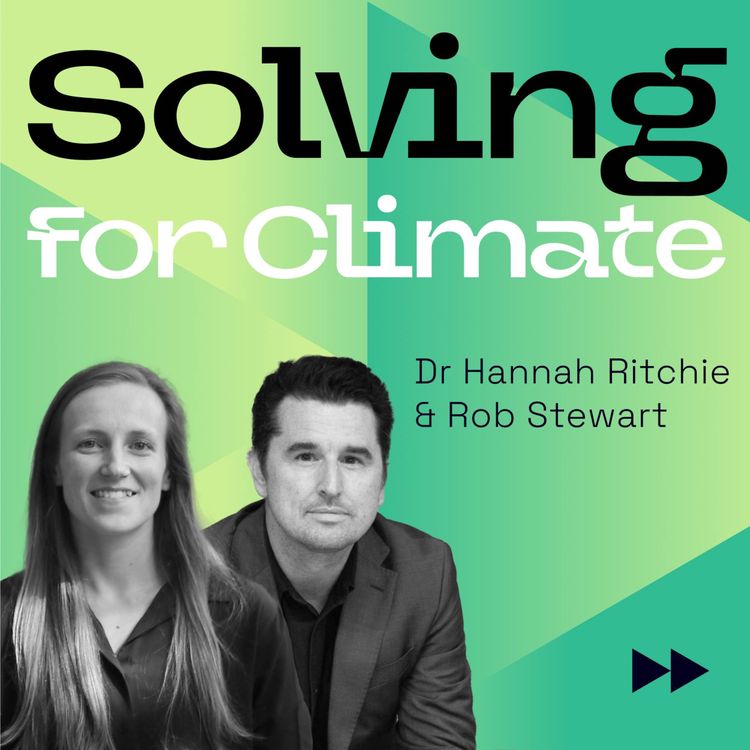
Solving for Climate
Dr Sasha Luccioni: The climate cost of AI
Despite the inexorable growth of Generative AI tools such as ChatGPT or Midjourney in the past couple of years, painfully little is known - or at least publicised - about their carbon impact. However, Dr Sasha Luccioni is on a mission to change that. Hannah and Rob talk to her about how she’s trying to maximise the benefits of AI, while minimising its hidden climate costs. Why is AI development such a black box? And could AI be part of the solution to the climate crisis?
Guest
Sasha Luccioni, AI and Climate Lead, Hugging Face
Co-hosts
Hannah Ritchie, Deputy Editor and Lead Researcher, Our World In Data @_HannahRitchie
Rob Stewart, Co-founder and Director of Sustainability, Koba
Visit Sasha's website and subscribe to Hannah's Substack 'Sustainability by numbers'
Produced by Rachel Balmer
Want to get in touch? Email solvingforclimate@gmail.com
Transcriptions available: https://solvingforclimate.substack.com/
Co-hosts
Hannah Ritchie, Deputy Editor and Lead Researcher, Our World in Data @_HannahRitchie
Rob Stewart, Co-founder and Director of Sustainability, Koba
Subscribe to Hannah's Substack 'Sustainability by numbers'
Want to get in touch? Email solvingforclimate@gmail.com
Maddie Drury, Series Producer
More episodes
View all episodes
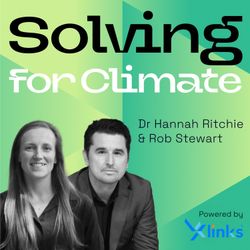
5. Charlotte Large: Can we heat homes from the London underground?
31:52||Season 5, Ep. 5Unusual heat sources like the London Underground and data centres are being used to heat and cool cities - they’re called, quite simply, heat networks. The director of one of the largest district heat networks in the UK explores how this could be a major decarbonising solution for population dense places around the world.Season five of Solving for Climate is sponsored by Xlinks xlinks.coPodcast transcripts available on SubstackCharlotte Large, Director of Clean Energy & Heat Networks at Westminster City CouncilCo-hosts Hannah Ritchie, Deputy Editor and Lead Researcher, Our World in Data @_HannahRitchie Rob Stewart, Co-founder Stealth AI startupSubscribe to Hannah's Substack 'Sustainability by numbers'Want to get in touch? Email solvingforclimate@gmail.comMaddie Drury, Series Producer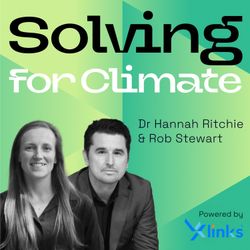
4. Ben Lamm: Would de-extincting species benefit the planet?
32:23||Season 5, Ep. 4The co-founder of Colossal Biosciences makes the climate case for bringing back extinct species like the woolly mammoth and the dodo. Colossal say de-extinction through gene editing techniques could have positive impacts for conservation and improving biodiversity. But the environment has changed completely since mammoths roamed the earth, so we’ll examine how realistic those climate claims are.Season five of Solving for Climate is sponsored by Xlinks xlinks.coPodcast transcripts available on SubstackBen Lamm, co-founder Colossal BiosciencesCo-hosts Hannah Ritchie, Deputy Editor and Lead Researcher, Our World in Data @_HannahRitchie Rob Stewart, Co-founder Stealth AI startupSubscribe to Hannah's Substack 'Sustainability by numbers'Want to get in touch? Email solvingforclimate@gmail.comMaddie Drury, Series Producer
3. Rahul Tongia: Is India on track to meet climate goals?
33:58||Season 5, Ep. 3Senior fellow at New Delhi based think-tank CSEP, Rahul Tongia, does a deep dive on India. It’s one of the world’s biggest emitters, but it’s also on the frontline of climate change; more than 80 percent of people live in places that are at risk of climate-induced disasters. Rahul explores whether their progress is fast enough, and whose responsibility it is to pay for those changes.Season five of Solving for Climate is sponsored by Xlinks xlinks.coPodcast transcripts available on SubstackRahul Tongia, Senior fellow at CSEPCo-hosts Hannah Ritchie, Deputy Editor and Lead Researcher, Our World in Data @_HannahRitchie Rob Stewart, Co-founder Stealth AI startupSubscribe to Hannah's Substack 'Sustainability by numbers'Want to get in touch? Email solvingforclimate@gmail.comMaddie Drury, Series Producer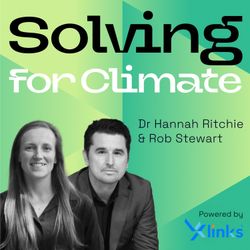
2. Prof Ed Hawkins: How to start climate conversations
31:34||Season 5, Ep. 2The scientist behind the famous warming stripes gives practical advice on how to talk about climate change in a way that actually brings about change. The climate stripes themselves will be remembered in history as a pivotal point in climate debate. Professor Ed Hawkins chats about what inspired the warming stripes, and the craziest reaction they’ve received.Season five of Solving for Climate is sponsored by Xlinks xlinks.coPodcast transcripts available on SubstackProfessor Ed Hawkins, Professor of Climate Science at the University of ReadingCo-hosts Hannah Ritchie, Deputy Editor and Lead Researcher, Our World in Data @_HannahRitchie Rob Stewart, Co-founder Stealth AI startupSubscribe to Hannah's Substack 'Sustainability by numbers'Want to get in touch? Email solvingforclimate@gmail.comMaddie Drury, Series Producer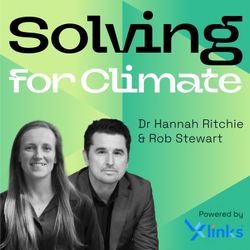
1. Dr Hannah Ritchie: Is AI bad for the planet?
32:30||Season 5, Ep. 1In this episode we put our resident data scientist in the hot seat, and discuss a range of topics across her new book, Clearing the Air. From AI’s energy appetite to the future of your household bills, and why electric vehicles leave Hannah feeling hopeful - her sharp, evidence driven answers will make you reconsider the headlines.Season five of Solving for Climate is sponsored by Xlinks xlinks.coPodcast transcripts available on SubstackCo-hosts Hannah Ritchie, Deputy Editor and Lead Researcher, Our World in Data @_HannahRitchie Rob Stewart, Co-founder Stealth AI startupSubscribe to Hannah's Substack 'Sustainability by numbers'Want to get in touch? Email solvingforclimate@gmail.comMaddie Drury, Series Producer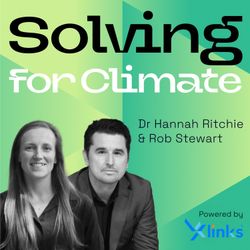
5. Mina Hasman: Inside the world of sustainable architecture
29:33||Season 4, Ep. 5Sustainability Director at the firm Skidmore, Owings & Merrill makes the case for solutions like algae-based concrete and direct air capture to be used within the buildings she designs.The materials and methods used in contemporary design are a recipe for what are currently very high carbon emissions. Hannah reflects on whether these are just pie in the sky ideas.Season four of Solving for Climate is sponsored by Xlinks xlinks.coPodcast transcripts available on SubstackMina Hasman, Sustainability Director at SOMHannah’s series at Our World in Data on extreme heatCo-hosts Hannah Ritchie, Deputy Editor and Lead Researcher, Our World in Data @_HannahRitchie Rob Stewart, Co-founder Stealth AI startupSubscribe to Hannah's Substack 'Sustainability by numbers'Want to get in touch? Email solvingforclimate@gmail.comMaddie Drury, Series Producer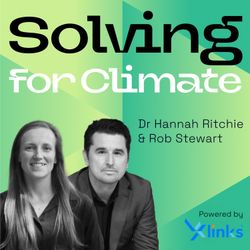
4. Ian McKay: How do we get rid of contrails?
29:40||Season 4, Ep. 4Founder of Orca Sciences reveals the surprisingly easy fix for contrails in aviation. As an incubator for other startups looking to get off the ground, Orca Sciences asks big questions like, how do we get rid of ‘sky graffiti’? Can you heat the earth directly? And can we just eat carbon?Season four of Solving for Climate is sponsored by Xlinks xlinks.coPodcast transcripts available on SubstackIan McKay, Founder of Orca SciencesCo-hosts Hannah Ritchie, Deputy Editor and Lead Researcher, Our World in Data @_HannahRitchie Rob Stewart, Co-founder Stealth AI startupSubscribe to Hannah's Substack 'Sustainability by numbers'Want to get in touch? Email solvingforclimate@gmail.comMaddie Drury, Series Producer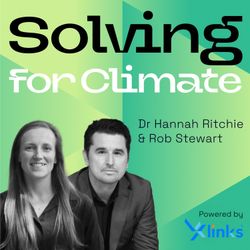
3. Leah Ellis: How do you decarbonise concrete?
29:24||Season 4, Ep. 3The CEO of Sublime Systems chats about their alternative to make cement. Generating about 8% of all global carbon dioxide emissions, Leah is using an exciting electrochemical process to reduce this figure. It’s used in the buildings around you, the roof over your head and the foundations beneath your feet - so how difficult will it be to reduce these high carbon emissions?Season four of Solving for Climate is sponsored by Xlinks xlinks.coPodcast transcripts available on SubstackLeah Ellis, CEO Sublime SystemsCo-hosts Hannah Ritchie, Deputy Editor and Lead Researcher, Our World in Data @_HannahRitchie Rob Stewart, Co-founder Stealth AI startupSubscribe to Hannah's Substack 'Sustainability by numbers'Want to get in touch? Email solvingforclimate@gmail.comMaddie Drury, Series Producer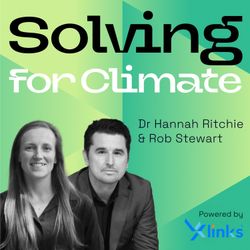
2. Lauri Myllyvirta: Is China a global climate leader?
29:27||Season 4, Ep. 2Senior fellow at the Asia Society Policy Institute's China Climate Hub, Lauri Myllyvirta, delivers a deep dive on China’s climate picture. Why is a country responsible for the overwhelming majority of the world’s emissions also scaling renewable energy at lightning speed? Hannah crunches the numbers on whether China’s construction of coal fired power plants comes at odds with their renewable credentials.Season four of Solving for Climate is sponsored by Xlinks xlinks.coPodcast transcripts available on SubstackLauri Myllyvirta, Co-founder, Centre for Research on Energy and Clean Air & Senior Fellow, Asia Society Policy InstituteCo-hosts Hannah Ritchie, Deputy Editor and Lead Researcher, Our World in Data @_HannahRitchie Rob Stewart, Co-founder Stealth AI startupSubscribe to Hannah's Substack 'Sustainability by numbers'Want to get in touch? Email solvingforclimate@gmail.comMadeleine Drury, Series Producer